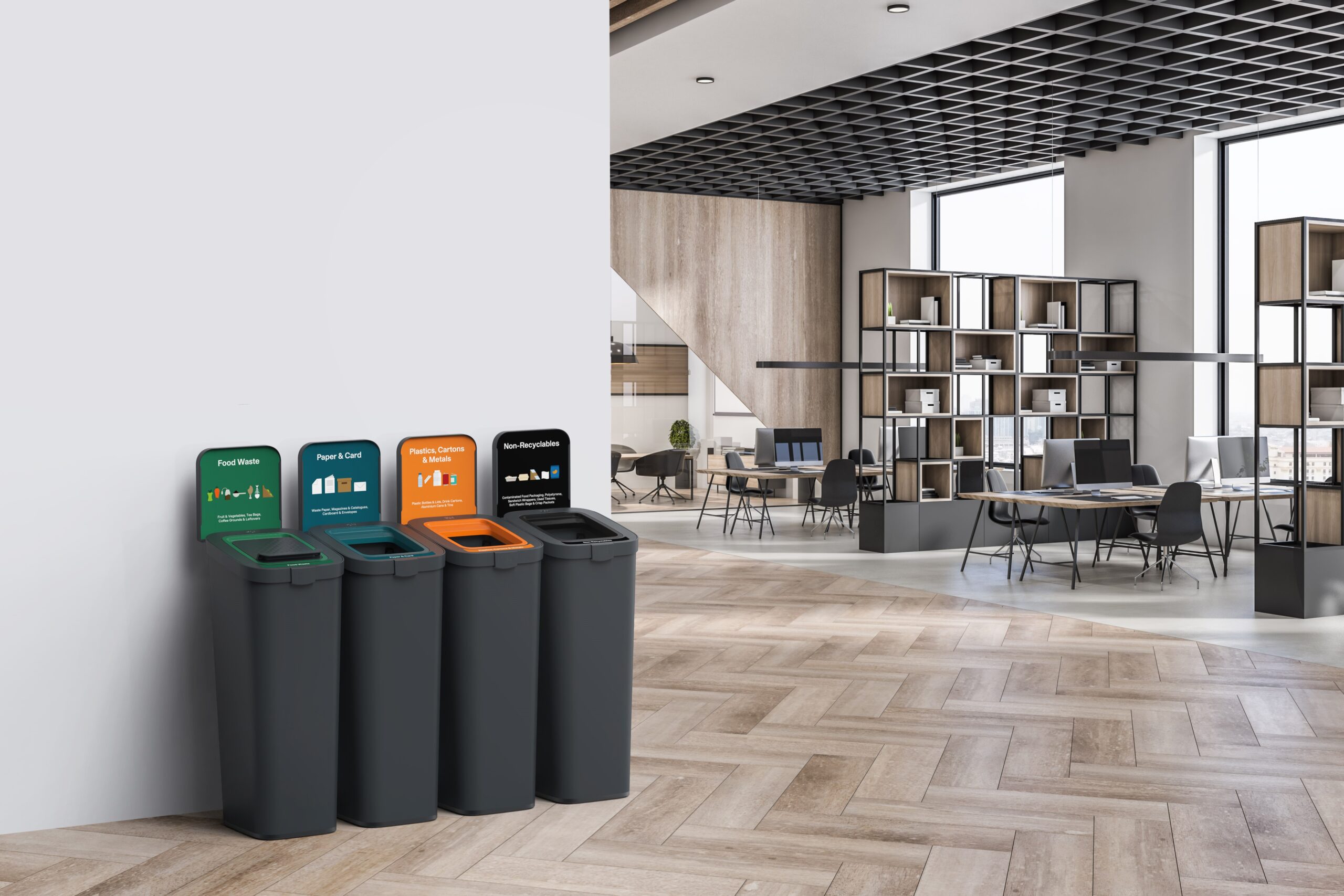Easter brings joy and celebration, but unfortunately, it increases waste tremendously. UK businesses sell millions of Easter eggs yearly (alongside sweets and Easter decorations), producing massive amounts of discarded packaging, wasted food, and environmental strain.
So, what can businesses do to help mitigate this impact? Solutions include waste reduction, recycling education, and adopting sustainable practices.
A greener Easter is a win-win for the planet and your business’s reputation. Why not lead the way?
The Scale of Easter Waste
UK Easter-facts that we shouldn’t ignore:
- Easter egg packaging contributes to over 4,300 tonnes of cardboard waste annually. See: Minimising Commercial Paper Waste With Effective Recycling Strategies
- The UK consumes the equivalent of 3.3 million plastic water bottles in plastic packaging for Easter eggs annually, aggravating the pollution crisis. Read: Plastic Recycling for UK Businesses in 2025
- Businesses generate thousands of tonnes of surplus Easter food, including chocolate, hot cross buns, roast meats, and vegetables, which can end up in general waste if not disposed off correctly as Food Waste. This increases general waste collection costs and CO2.
The lack of proper recycling overfills landfills, pollutes the environment and increases the atmosphere’s toxic emissions.
Businesses must lead by reducing waste, investing in better recycling infrastructure, and ensuring materials are disposed of correctly with employee recycling education and recycling awareness campaigns.
Increased Waste and Contamination During Easter
Festive periods like Easter, most of the time, lead to increased waste generation and contamination in recycling streams.
The festive atmosphere and lower attention to correct separation at source can lead to poorer waste disposal practices, increasing the risk of contamination. For example, food residues on recyclable packaging can make entire batches non-recyclable, sending them directly to landfill or incineration.
How Businesses Can Lead a Sustainable Easter
Cut Excessive Packaging
Easter eggs are often wrapped in excessive packaging. A good starting point would be for companies to address this issue at the source:
- Create packaging that uses less material without compromising product integrity.
- Replace plastic inserts with biodegradable or compostable materials.
- Label packaging with straightforward guidelines to assist consumers in proper disposal.
Retailers can reward customers who choose waste-conscious products by offering discounts for minimal packaging or implementing return schemes, encouraging eco-friendly choices.
Improve Recycling Infrastructure
Recycling is effective only when businesses offer accessible recycling stations with clear, engaging signage and intuitive apertures.
Companies should:
- Place dedicated recycling stations in stores, offices, and manufacturing facilities to facilitate proper waste segregation.
- Collaborate with reputable recycling companies to ensure responsible disposal of their waste.
- Conduct training sessions on proper recycling practices to minimise contamination in the workplace and increase recycling rates.
Proper recycling infrastructure keeps waste out of landfills and ensures valuable materials return to production cycles instead of harming the environment.
Explore:
Reduce Food Waste
Food waste surges at Easter, but businesses can take steps to prevent it:
- Sell meal kits or products in sizes that match typical consumption to minimise leftovers.
- Partner with food banks or charities to distribute unsold edible products, reducing waste and aiding communities.
- Provide guidance on repurposing surplus food for alternative products or redistribution efforts.
- Ensure food waste recycling units are available across your workplace (especially near kitchens). Food waste can be recycled and turned into compost, fertiliser, or used to generate energy.
Restaurants, food manufacturers, and supermarkets can work with local organisations to donate excess food before it expires. Moreover, recycling stations should be incorporated to minimise food waste going to general waste.
Reducing Commercial Food Waste: Why It Matters and How Food Waste Recycling Bins Can Help
Promote Reuse and Upcycling
Encouraging customers to reuse materials reduces demand for new resources. Businesses can:
- Offer high-quality, sustainable Easter decorations designed for multiple years of use.
- Introduce products like refillable eggs that can be used annually, reducing single-use plastic waste.
- Create programmes where customers can return used packaging for upcycling in exchange for discounts or loyalty points.
Marketing campaigns can highlight DIY ideas for repurposing packaging into craft projects, decorations, or storage containers. The more businesses encourage reuse, the less waste enters the environment.
Educate and Engage Customers and Employees
Sustainability succeeds when businesses engage customers and employees. Companies should:
- Educate consumers and employees about the environmental impact of Easter waste and ways to mitigate it.
- Guide on reducing, reusing, and recycling holiday materials effectively.
- Reward customers and staff who make sustainable choices.
Supermarkets and retailers can place signs near Easter products explaining which materials are recyclable and how to dispose of them properly. Clear guidance encourages customers and staff to make informed, eco-friendly decisions.
Read more about How to Communicate Your Corporate Sustainability Authentically
The Importance of Proper Recycling
Recycling only works if done correctly. Contaminated materials disrupt the process and send recyclable items to landfills. Businesses must:
- Ensure employees understand how to properly dispose of waste properly to prevent contamination.
- Use clear, visible signs to guide staff and customers on what can and cannot be recycled.
- Work closely with recycling centres to understand and meet their requirements for material quality.
Proper recycling keeps valuable materials in circulation and reduces overall environmental impact.
Sustainability is good for the environment but also helps businesses grow. Nowadays, more and more customers prefer eco-conscious brands. Reducing waste, offering recyclable packaging, and implementing green initiatives improve brand reputation and customer loyalty. Governments continue tightening regulations on waste management so proactive businesses stay ahead of compliance requirements.
Read about the new Simpler Recycling Law coming into effect on March 31, 2025.
Easter should symbolise renewal, not environmental damage… Businesses must lead the way by cutting waste, promoting recycling, and investing in sustainability. Sustainable or reusable packaging, food waste reduction, and improved recycling efforts can be an excellent start for companies to make a real, long-lasting difference.
This Easter, let’s focus on reducing waste, recycling responsibly, reusing materials, and building good, long-lasting recycling habits. Every small step adds up. The future depends on what businesses do today.
Unisort empowers organisations daily to promote & increase recycling at work. Get in touch for complimentary advice and actionable steps.
Relevant reading:


